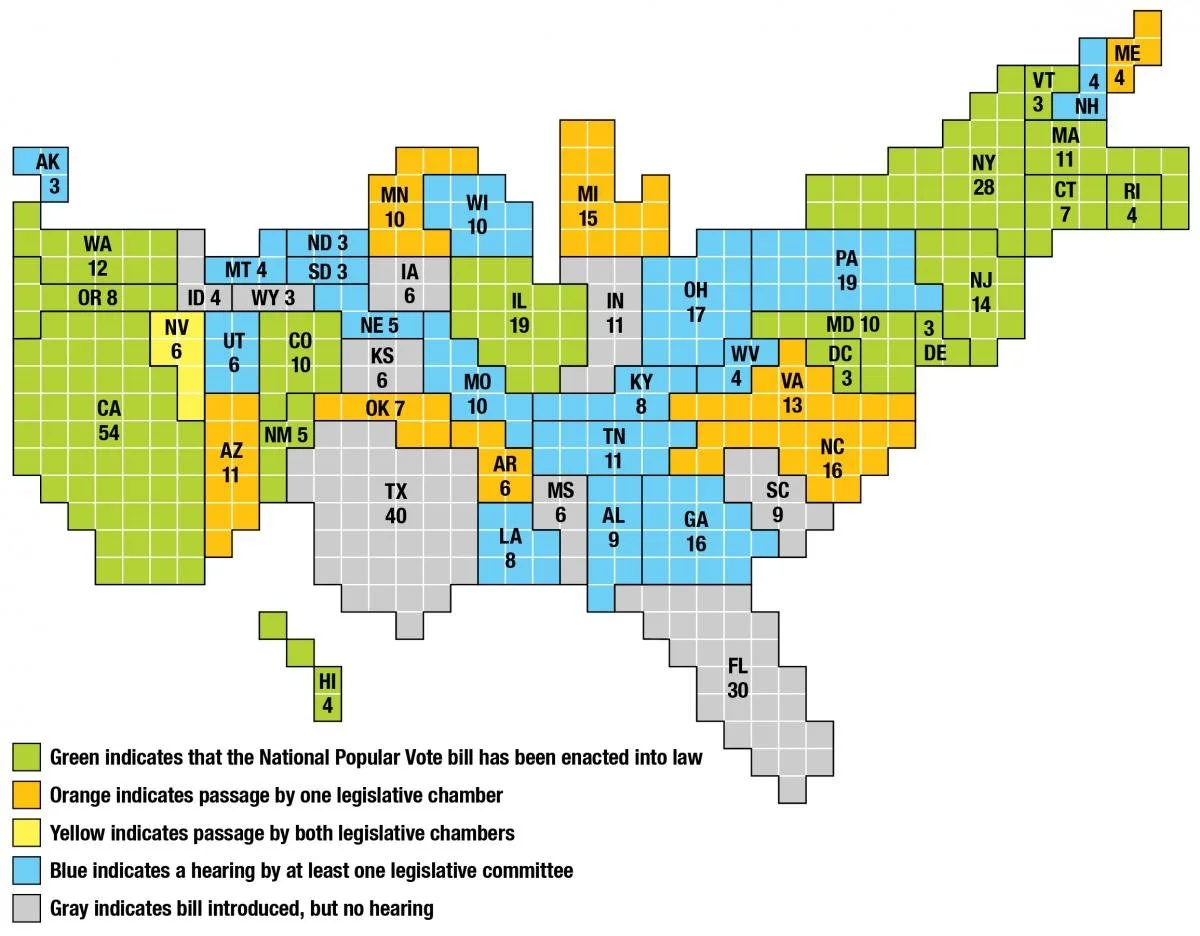Farewell Electoral College, Hello NPV
Article by Victor Hinojosa, TPT Staff Writer
The Electoral College; the system that chooses the President of the United States every four years. For the length that our nation has been on this Earth, we have elected our Commander-in-Chief in a very simplistic system—538 members from all 50 states, including DC, cast their votes for our next President and only 270 votes are needed to win. To most Americans, that’s just the way it’s always been. We go out to the polls and cast our ballot; simple. In reality, this “college” was just one of the many compromises made in 1787 that has worn out its use. This system makes it possible for a candidate to win a majority of the electoral votes without winning the popular vote, happening a whopping five times during the history of national elections. This “college” also was based on the racist 3/5th Clause of the Constitution- leading southern states to artificially inflate their electoral votes and influence election after election. Finally, in modern times, it leads candidates to just focus on a few states that are crucial in winning an election. Over the centuries, we have seen many efforts to alter or abolish the Electoral College, with various degrees of success, but one stands out the most: The National Popular Interstate Compact, the plan to drastically change the Electoral College forever.
Image via National Popular Vote
The National Popular Vote Interstate Compact, “NPV” for short, is a way to constitutionally alter the electoral college to work more like a popular vote. The NPV main point stems from the Constitution itself. Article II Section I Clause II states that the electors of the College shall be chosen by the state legislatures. The NPV basically uses this part to its advantage. If the states can choose any electors for president, then why not attach a state's electors to the national popular vote? This basically locks the Electoral College within its own boundaries and forces states within the pact to push its electoral votes to the national popular vote winner. The pact is only able to be enforced when at least 270 total electoral votes from any total number of states get reached; until then, it has no legal validity. If it was able to just even reach half of that goal, let’s say, 100 electoral votes— it would have a considerable amount of electoral power to wield, but there would still be 438 votes at stake. That’s far enough for another candidate to use without any of the other 100, and it might lead to political suicide if just a few states invoke NPV if their populations chooses the other candidate— the states would have no valid excuse to this if less then the necessary amount to win a presidential election isn’t even there. In quick review, the NPV is a legal contract between states that control the electoral college within the confines of its own legal rulebook: the Constitution. This pact will use the words in the Constitution to let the “sign here” states, once it reaches 270 electoral votes, to instruct the legislatures to slate electors in tune with the national popular vote.
The NPV is one step forward towards the popular selection of the president. This pact reflects what the American public and the world presume of the American system of government; a step closer to fulfilling our intended cradle of democracy. The NPV cuts the problems of the Electoral College, from the minority of voters choosing the president to making American elections just a bit more democratic; it jails the Electoral College, making it work for the American people and not for the political strategists who play their cards right. As the pact keeps getting more and more states (195 electoral votes as of 2022), we can practically smell the newscaster projecting the new President-elect, chosen by the majority of voters. At the end of the day, we need the NPV— for the Electoral College, with its racist roots is at its deathbed, for the voice of the voter shouts louder than a bunch of dead white men from the 18th Century.
Bye-bye Electoral College— we will never miss you.
The views articulated in this piece are the writer’s own, and do not reflect the official stances of The Progressive Teen or HSDA at large.

